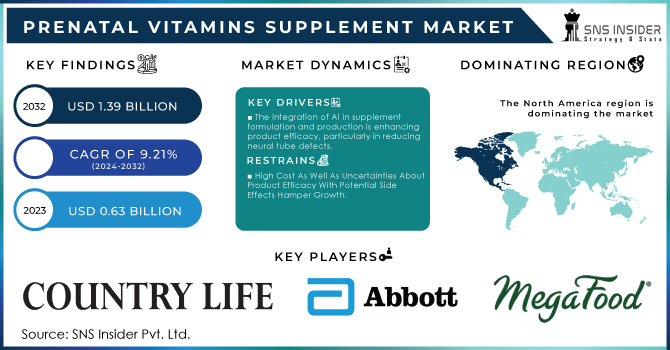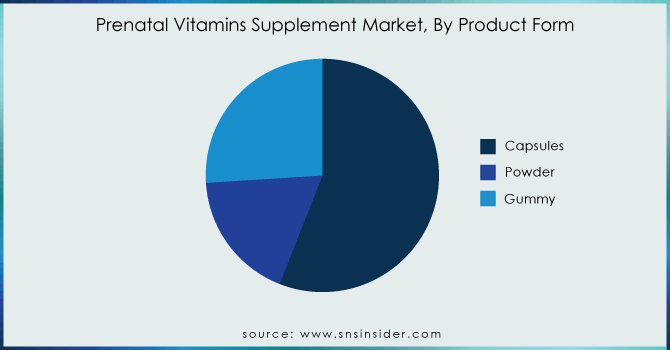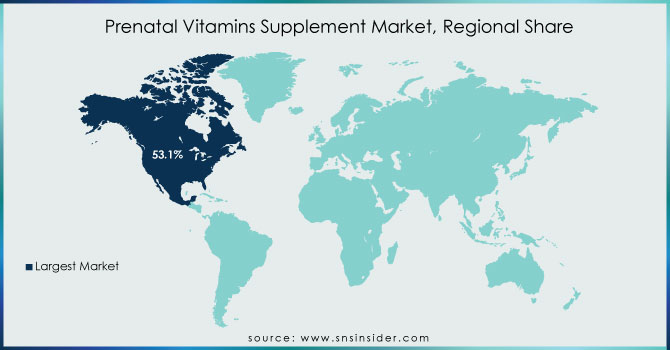Prenatal Vitamins Supplement Market Report Scope& Overview:

Get more information on Prenatal Vitamins Supplement Market - Request Sample Report
The Prenatal Vitamins Supplement Market size was valued at USD 0.63 billion in 2023, and is expected to reach USD 1.39 billion by 2032, and grow at a CAGR of 9.21% over the forecast period 2024-2032.
Prenatal vitamin supplements are in high demand due to the significantly increased nutrient requirements of pregnant women. To support the rapid growth and development of a baby, a woman's body needs up to 50% more vitamins and minerals than usual. This heightened demand often cannot be met solely through diet, especially in regions with limited food access or nutritional deficiencies.
For example, iron deficiency that is anemia affects 36% of pregnant women worldwide and is an important cause of maternal mortality. Prenatal vitamins containing iron can help prevent anemia condition and its severe values. Additionally, folic acid, a key component of these supplements, is crucial for preventing neural tube defects, serious birth defects of the brain and spinal cord.
The World Health Organization recommends regular iron and folic acid (IFA) supplementation for pregnant women, typically containing 30-60 mg of elemental iron and 400 micrograms of folic acid. In regions with lower anemia rates or where side effects are common, intermittent weekly, IFA supplementation with higher doses might be considered. The WHO also promotes daily calcium supplementation for those with low dietary calcium intake and vitamin A supplementation where deficiency is prevalent. While zinc supplementation is conditionally recommended based on specific research, vitamin D supplementation is not advised for improving maternal or perinatal outcomes. The National Academies of Sciences, Engineering, and Medicine offer similar micronutrient recommendations for pregnancy, with slight variations from WHO guidelines.
The impact of maternal malnutrition extends beyond pregnancy. Children born to undernourished mothers are at higher risk of physical and cognitive impairments, hindering their lifelong potential. By addressing nutrient gaps through prenatal vitamins, they can contribute to healthier mothers, babies, and future generations.
Vitamin Angels' nutritional supplement is a carefully formulated blend of 15 essential vitamins and minerals, including iron and folic acid. This scientifically proven combination aligns with the United Nations International Multiple Micronutrient Antenatal Preparation (UNIMMAP) MMS standard and is recognized globally as a vital supplement for pregnant women and also endorsed by WHO as an essential medicine.
The prenatal vitamin supplement market is a dynamic and competitive space, characterized by a wide array of products with varying formulations and ingredients. This diversity, while offering consumers choice, also presents challenges in terms of product evaluation and selection.
According to NutraIngredients USA article of Jan 2024, the prenatal supplement market is vast and varied, with over 800 products currently available in the U.S. The recent GAO report, while focusing on a small sample of 12 products, highlights potential inconsistencies in nutrient content across different brands and formulations. This suggests a broader industry challenge in ensuring product quality and consistency.
To navigate this complex market, consumers increasingly rely on expert recommendations and independent product reviews. This growing demand for informed decision-making has led to the emergence of platforms that provide comparative analysis of prenatal vitamins based on factors such as nutrient content, cost, and third-party certifications.
Moreover, the market is influenced by factors such as consumer preferences (e.g., vegan, organic, gummy vs. tablet), regulatory standards, and technological advancements in supplement formulation and delivery.
A study issued in The American Journal of Clinical Nutrition in 2023 reveals that a staggering 99% of affordable prenatal supplements lack the proper levels of essential micronutrients. Furthermore, only one out of 400 products examined offered optimal nutritional content.
A recent government investigation in 2024 revealed significant discrepancies in the nutrient content of prenatal supplements. The U.S. Government Accountability Office found that nearly all prenatal vitamins tested contained inaccurate levels of key nutrients, with some products providing far more or less than advertised. Experts warn that these inconsistencies pose potential health risks for pregnant women and highlight the need for stricter regulations in the supplement industry.
Overall, the prenatal vitamin supplement market is a rapidly evolving landscape driven by consumer needs, scientific research, and industry innovation.
Market Dynamics
Drivers
-
The integration of AI in supplement formulation and production is enhancing product efficacy, particularly in reducing neural tube defects.
Artificial intelligence is revolutionizing drug delivery systems by offering unprecedented capabilities in formulation design and optimization.Through advanced data analysis and predictive modelling, AI enables the creation of highly tailored drug delivery systems that enhance efficacy, safety, and patient outcomes.By identifying optimal excipients, exploring innovative delivery mechanisms, and accounting for individual patient characteristics, AI is accelerating the development of personalized and effective treatments.
-
Modern lifestyles often lead to vitamin and mineral deficiencies in women, increasing the demand for prenatal supplements.
The demands of contemporary life often led to dietary imbalances and nutrient deficiencies, particularly among women of childbearing age. Fast-paced lifestyles, characterized by processed foods, irregular meal patterns, and limited time for food preparation, contribute to inadequate intake of essential vitamins and minerals. A study published in the Journal of the American Medical Association found that nearly 90% of American women aged 19-50 years failed to meet the recommended daily intake for at least one essential nutrient.
Pregnancy further exacerbates these nutritional challenges. The increased metabolic demands of Fetal growth and development necessitate a higher intake of nutrients such as folic acid, iron, calcium, and vitamin D. A deficiency in any of these micronutrients can have serious consequences for both mother and child, including low birth weight, preterm delivery, and neural tube defects.
Consequently, the demand for prenatal supplements has surged. These supplements aim to bridge the nutritional gap and provide the necessary micronutrients for optimal maternal and Fetal health. However, it is essential to note that while supplements can be beneficial, a balanced and diverse diet should remain the foundation of prenatal nutrition.
-
Growing considerate of the importance of prenatal care and nutrition is driving product consumption.
Restraints
-
High Cost As Well As Uncertainties About Product Efficacy With Potential Side Effects Hamper Growth
High prices, coupled with uncertainties about product efficacy and potential side effects, reduce consumer demand. Additionally, strict regulatory approval processes create significant barriers to market entry. While increased industry investments offer potential growth avenues, overcoming these hurdles is essential for market expansion.
Key Segmentation
By Product Form
Based on product form, with capsules emerged as the leading category in 2023 with 56.98% market share. This dominance is attributed to several factors. Capsules offer a longer shelf life, making them a preferred choice for healthcare providers. Advancements in capsule filling technology have streamlined manufacturing processes, further boosting their popularity. Additionally, the ease with which capsules dissolve in the stomach contributes to their consumer appeal.

Get Customized Report as per your Business Requirement - Request For Customized Report
By Distribution Channel
Supermarkets and drug stores held the largest market share with 62% in 2023 due to the convenience of one-stop shopping. This is particularly true in developing countries within the Asia Pacific region, where rising disposable income allows consumers to make bulk purchases of prenatal vitamins alongside other groceries or medications.
The online platform is poised for the fastest growth in the coming years. This is fueled by advancements in technology and increasing consumer adoption of online shopping. Popular e-commerce platforms like Amazon are expanding their reach and offering prenatal vitamins, especially in areas with limited access to specialty stores. This online convenience, coupled with attractive discounts compared to traditional stores, is driving sales growth through this channel.
Regional Analysis
North America dominated the prenatal vitamin supplement market, held a 53.1% share in 2023. This leadership is driven by factors such as a growing preference for self-care, widespread availability of dietary supplements, and a sedentary lifestyle among women and the region is expected to maintain its dominance during 2024-2032.
Europe is poised for substantial growth. The market is influenced by increasing awareness of maternal health and the need for improved prenatal care.
Asia Pacific emerges as a promising market, particularly in countries like India, where rising disposable incomes are fueling demand for healthcare products. The region's large population of women of childbearing age and growing emphasis on maternal health present significant growth opportunities.
Emerging economies across the globe are recognizing the importance of maternal nutrition and are investing in initiatives to improve prenatal care. This focus is expected to contribute significantly to the market's expansion in these regions.

Key Players
Country Life LLC, Abbott Nutrition, Garden of Life Inc., New Chapter, Inc., MegaFood, Rainbow Light Nutritional Systems Inc., Nordic Naturals, Biotics Research Corporation, Church & Dwight Co. Inc., Procter & Gamble and others.
Recent Developments
Approved by OB/GYNs and Moms in 2024
-
Nature Made Prenatal Multivitamin Folic Acid + DHA vitamins, a recent award winner in 2023, provides a cost-effective solution rich in folic acid, iron, calcium, vitamin D, and DHA—a crucial omega-3 fatty acid.
-
Vitafusion Prenatal Gummies offer a convenient and palatable alternative for pregnant women. Packed with essential nutrients including DHA and a higher-than-recommended dose of vitamin D, these gummies address the needs of many.
| Report Attributes | Details |
|---|---|
| Market Size in 2023 | US$ 0.63 billion |
| Market Size by 2032 | US$ 1.39 Billion |
| CAGR | CAGR of 9.21% From 2024 to 2032 |
| Base Year | 2023 |
| Forecast Period | 2024-2032 |
| Historical Data | 2020-2022 |
| Report Scope & Coverage | Market Size, Segments Analysis, Competitive Landscape, Regional Analysis, DROC & SWOT Analysis, Forecast Outlook |
| Key Segments | • By Product Form (Capsules, Powder, Gummy) • By Distribution Channel (Supermarket and Drug Store, Online Platform) |
| Regional Analysis/Coverage | North America (US, Canada, Mexico), Europe (Eastern Europe [Poland, Romania, Hungary, Turkey, Rest of Eastern Europe] Western Europe] Germany, France, UK, Italy, Spain, Netherlands, Switzerland, Austria, Rest of Western Europe]), Asia Pacific (China, India, Japan, South Korea, Vietnam, Singapore, Australia, Rest of Asia Pacific), Middle East & Africa (Middle East [UAE, Egypt, Saudi Arabia, Qatar, Rest of Middle East], Africa [Nigeria, South Africa, Rest of Africa], Latin America (Brazil, Argentina, Colombia, Rest of Latin America) |
| Company Profiles | Country Life LLC, Abbott Nutrition, Garden of Life Inc., New Chapter, Inc., MegaFood, Rainbow Light Nutritional Systems Inc., Nordic Naturals, Biotics Research Corporation, Church & Dwight Co. Inc., Procter & Gamble and others |
| Key Drivers | • The integration of AI in supplement formulation and production is enhancing product efficacy, particularly in reducing neural tube defects. • Modern lifestyles often lead to vitamin and mineral deficiencies in women, increasing the demand for prenatal supplements. • Growing considerate of the importance of prenatal care and nutrition is driving product consumption. |
| Restraints | • High Cost As Well As Uncertainties About Product Efficacy With Potential Side Effects Hamper Growth |

